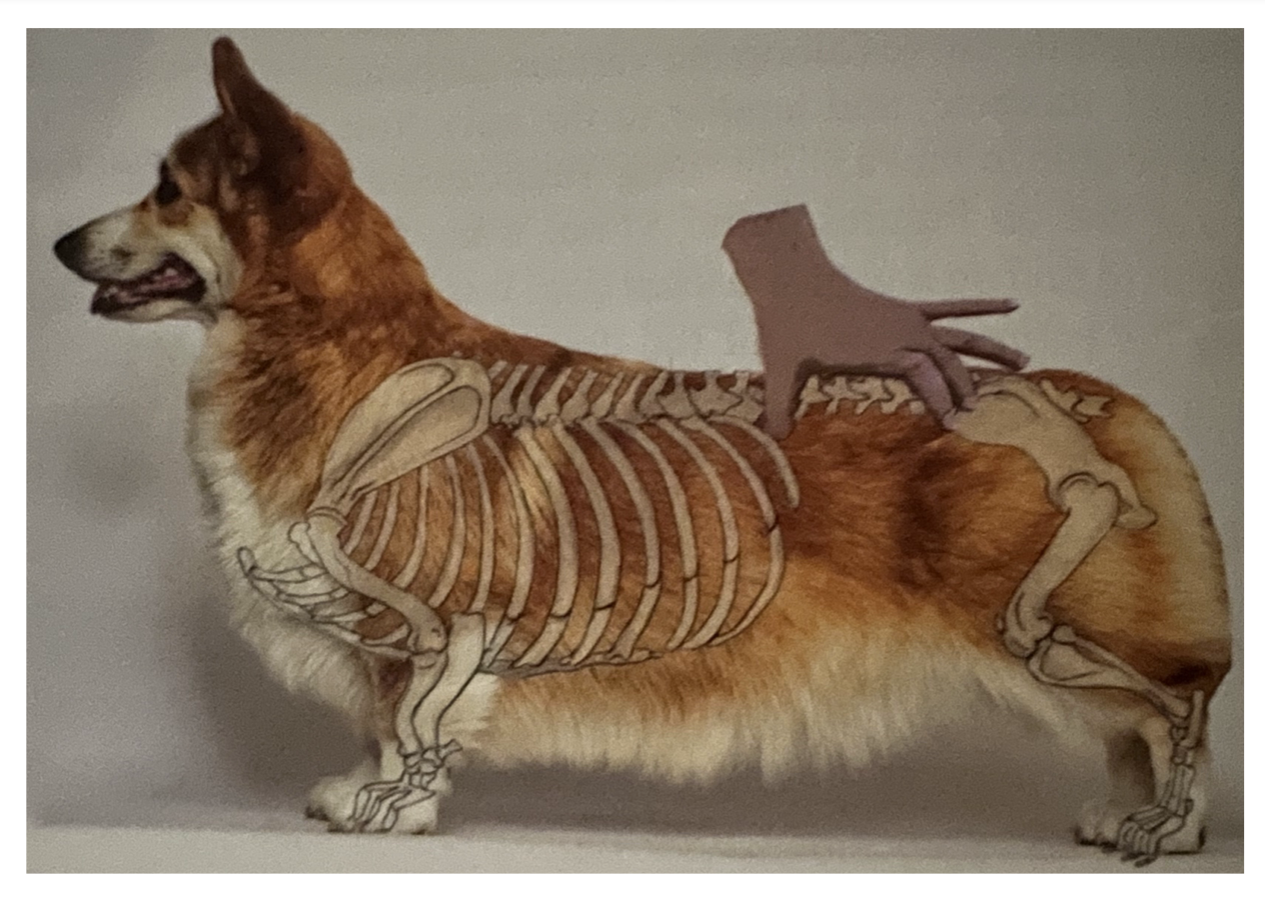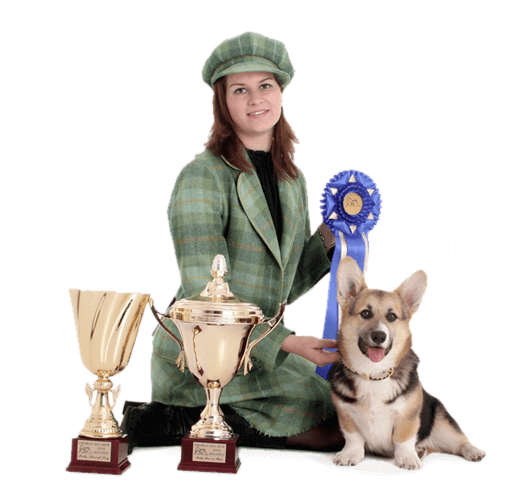GENERAL APPEARANCE: FCI = KC = ANKC
Low set, strong, sturdily built, alert and active, giving impression of substance and stamina in small space.
AKC
Low-set, strong, sturdily built and active, giving an impression of substance and stamina in a small space. Should not be so low and heavy-boned as to appear coarse or overdone, nor so light-boned as to appear racy. Outlook bold, but kindly. Expression intelligent and interested. Never shy nor vicious.
Correct type, including general balance and outline, attractiveness of headpiece, intelligent outlook and correct temperament are of primary importance. Movement is especially important, particularly as viewed from the side. A dog with smooth and free gait has to be reasonably sound and must be highly regarded. A minor fault must never take precedence over the above desired qualities.
A dog must be very seriously penalized for the following faults, regardless of whatever desirable qualities the dog may present: oversized or undersized; button, rose or drop ears; overshot or undershot bite; fluffies, whitelies, mismarks or bluies.
BEHAVIOUR/TEMPERAMENT: FCI = KC = ANKC
Bold in outlook, workmanlike. Outgoing and friendly never nervous or aggressive.
AKC
Temperament: Outlook bold, but kindly. Never shy or vicious. The judge shall dismiss from the ring any Pembroke Welsh Corgi that is excessively shy.
HEAD: FCI = KC = ANKC
Head foxy in shape and appearance, with alert, intelligent expression
IMPORTANT PROPORTIONS: Length of foreface to be in proportion to skull 3 to 5.
CRANIAL REGION:
Skull: Fairly wide and flat between ears. Stop: Moderate.
FACIAL REGION:
Nose: Black.
Muzzle: Slightly tapering.
Jaws/Teeth: Strong with perfect, regular and complete scissor bite, i.e. upper teeth closely overlapping the lower teeth and set square to the jaws.
AKC
Head: The head should be foxy in shape and appearance. Expression – Intelligent and interested, but not sly. Skull – should be fairly wide and flat between the ears. Moderate amount of stop. Very slight rounding of cheek, not filled in below the eyes, as foreface should be nicely chiseled to give a somewhat tapered muzzle. Distance from occiput to center of stop to be greater than the distance from stop to nose tip, the proportion being five parts of total distance for the skull and three parts for the foreface. Muzzle should be neither dish-faced nor Roman-nosed.
Nose – Black and fully pigmented. Mouth – Scissors bite, the inner side of the upper incisors touching the outer side of the lower incisors. Level bite is acceptable. Overshot or undershot bite is a very serious fault. Lips – Black, tight with little or no fullness.
EYES: FCI = KC = ANKC
Well set, round, medium size, brown, blending with colour of coat.
AKC
Eyes – Oval, medium in size, not round, nor protruding, nor deepset and piglike. Set somewhat obliquely. Variations of brown in harmony with coat color. Eye rims dark, preferably black. While dark eyes enhance the expression, true black eyes are most undesirable, as are yellow or bluish eyes.
EARS: FCI = KC = ANKC
Pricked, medium sized, slightly rounded. Line drawn from tip of nose through eye should, if extended, pass through, or close to tip of ear.
AKC
Ears – Erect, firm, and of medium size, tapering slightly to a rounded point. Ears are mobile, and react sensitively to sounds. A line drawn from the nose tip through the eyes to the ear tips, and across, should form an approximate equilateral triangle. Bat ears, small catlike ears, overly large weak ears, hooded ears, ears carried too high or too low, are undesirable. Button, rose or drop ears are very serious faults.
NECK: FCI = KC = ANKC
Fairly long.
AKC
Neck – Fairly long. Of sufficient length to provide over-all balance of the dog. Slightly arched, clean and blending well into the shoulders. A very short neck giving a stuffy appearance and a long, thin or ewe neck are faulty.
BODY: FCI = KC = ANKC
Medium length, not short coupled, slightly tapering, when viewed from above.
Topline: Level.
Chest: Chest broad and deep, well let down between forelegs. Well sprung ribs.
AKC
Topline – Firm and level, neither riding up to nor falling away at the croup. A slight depression behind the shoulders caused by heavier neck coat meeting the shorter body coat is permissible.
Body – Rib cage should be well sprung, slightly egg-shaped and moderately long. Deep chest, well let down between the forelegs.
Exaggerated lowness interferes with the desired freedom of movement and should be penalized. Viewed from above, the body should taper slightly to end of loin. Loin short. Round or flat rib cage, lack of brisket, extreme length or cobbiness, are undesirable.
TAIL: FCI = KC = ANKC
Previously customarily docked short.
Undocked: set in line with the top line. Natural carriage which may be above or below top line when moving or alert.
Natural bobtails may occur, when the tail can be of any length, carried above or below top line when moving or alert.
AKC
Tail – Docked as short as possible without being indented. Occasionally a puppy is born with a natural dock, which if sufficiently short, is acceptable. A tail up to two inches in length is allowed, but if carried high tends to spoil the contour of the topline.
LIMBS FOREQUARTERS: FCI = KC = ANKC
Shoulder: Well-laid and angulated at 90 degrees to the upper arm.
Upper arm: Moulded round chest.
Elbow: Fitting closely to sides, neither loose nor tied.
Forearm: Short and as straight as possible. Ample bone, carried right down to feet.
Forefeet: Oval, toes strong, well arched, and tight, two centre toes slightly advance, of two outer, pads strong and well arched. Nails short.
AKC
Forequarters:
Legs – Short, forearms turned slightly inward, with the distance between wrists less than between the shoulder joints, so that the front does not appear absolutely straight. Ample bone carried right down into the feet. Pasterns firm and nearly straight when viewed from the side. Weak pasterns and knuckling over are serious faults. Shoulder blades long and well laid back along the rib cage. Upper arms nearly equal in length to shoulder blades. Elbows parallel to the body, not prominent, and well set back to allow a line perpendicular to the ground to be drawn from tip of the shoulder blade through to elbow. Feet – Oval, with the two center toes slightly in advance of the two outer ones. Turning neither in nor out. Pads strong and feet arched. Nails short. Dewclaws on both forelegs and hindlegs usually removed. Too round, long and narrow, or splayed feet are faulty.
FCI = KC = ANKC
HINDQUARTERS:
General appearance: Strong and flexible. Legs short. Ample bone carried right down to feet.
Stifle (Knee): Well angulated. Hock joint: Hocks straight when viewed from behind.
Hind feet: Oval, toes strong, well arched, and tight, two centre toes slightly advance, of two outer, pads strong and well arched. Nails short.
AKC
Hindquarters: Ample bone, strong and flexible, moderately angulated at stifle and hock. Exaggerated angulation is as faulty as too little. Thighs should be well muscled. Hocks short, parallel, and when viewed from the side are perpendicular to the ground. Barrel hocks or cowhocks are most objectionable. Slipped or double-jointed hocks are very faulty. Feet – as in front.
GAIT / MOVEMENT: FCI = KC = ANKC
Free and active, neither loose nor tied. Forelegs move well forward, without too much lift, in unison with thrusting action of hindlegs.
AKC
Gait: Free and smooth. Forelegs should reach well forward without too much lift, in unison with the driving action of the hind legs. The correct shoulder assembly and well-fitted elbows allow a long, free stride in front. Viewed from the front, legs do not move in exact parallel planes, but incline slightly inward to compensate for shortness of leg and width of chest. Hind legs should drive well under the body and move on a line with the forelegs, with hocks turning neither in nor out. Feet must travel parallel to the line of motion with no tendency to swing out, cross over or interfere with each other. Short, choppy movement, rolling or high-stepping gait, close or overly wide coming or going, are incorrect. This is a herding dog, which must have the agility, freedom of movement, and endurance to do the work for which he was developed.
COAT: FCI = KC = ANKC
Hair: Medium length, straight with dense undercoat, never soft, wavy or wiry.
Colour: Self colours in Red, Sable, Fawn, Black and Tan, with or without white markings on legs, brisket and neck. Some white on head and foreface permissible.
AKC
Coat: Medium length; short, thick, weather- resistant undercoat with a coarser, longer outer coat. Over-all length varies, with slightly thicker and longer ruff around the neck, chest and on the shoulders. The body coat lies flat. Hair is slightly longer on back of forelegs and underparts and somewhat fuller and longer on rear of hindquarters. The coat is preferably straight, but some waviness is permitted. This breed has a shedding coat, and seasonal lack of undercoat should not be too severely penalized, providing the hair is glossy, healthy and well groomed. A wiry, tightly marcelled coat is very faulty, as is an overly short, smooth and thin coat. Very Serious Fault – Fluffies – a coat of extreme length with exaggerated feathering on ears, chest, legs and feet, underparts and hindquarters. Trimming such a coat does not make it any more acceptable. The Corgi should be shown in its natural condition, with no trimming permitted except to tidy the feet, and, if desired, remove the whiskers.
Color: The outer coat is to be of self colors in red, sable, fawn, black and tan with or without white markings. White is acceptable on legs, chest, neck (either in part or as a collar), muzzle, underparts and as a narrow blaze on head. Very Serious Faults – Whitelies – Body color white, with red or dark markings. Bluies – Colored portions of the coat have a distinct bluish or smoky cast. This coloring is associated with extremely light or blue eyes, liver or gray eye rims, nose and lip pigment. Mismarks – Self colors with any area of white on the back between withers and tail, on sides between elbows and back of hindquarters, or on ears. Black with white markings and no tan present.
SIZE AND WEIGHT: FCI = KC = ANKC
Height at the withers: Approximately 25 – 30 cm.
Weight: Males: 10-12 kg. Females: 9-11 kg.
AKC
Size, Proportion, Substance:
Size – Height (from ground to highest point on withers) should be 10 to 12 inches. Weight is in proportion to size, not exceeding 30 pounds for dogs and 28 pounds for bitches. In show condition, the preferred medium- sized dog of correct bone and substance will weigh approximately 27 pounds, with bitches approximately 25 pounds. Obvious oversized specimens and diminutive toylike individuals must be very severely penalized.
Proportions – Moderately long and low. The distance from the withers to the base of the tail should be approximately 40 percent greater than the distance from the withers to the ground. Substance – Should not be so low and heavy-boned as to appear coarse or overdone, nor so light-boned as to appear racy.
FAULTS: FCI = KC = ANKC
Any departure from the foregoing points should be considered a fault and the seriousness with which the fault should be regarded should be in exact proportion to its degree and its effect upon the health and welfare of the dog and its ability to perform its traditional work.
FCI
DISQUALIFYING FAULTS
• Aggressive or overly shy dogs.
• Any dog clearly showing physical or behavioural abnormalities.
N.B:
• Male animals should have two apparently normal testicles fully descended into the scrotum.
• Only functionally and clinically healthy dogs, with breed typical conformation, should be used for breeding.

